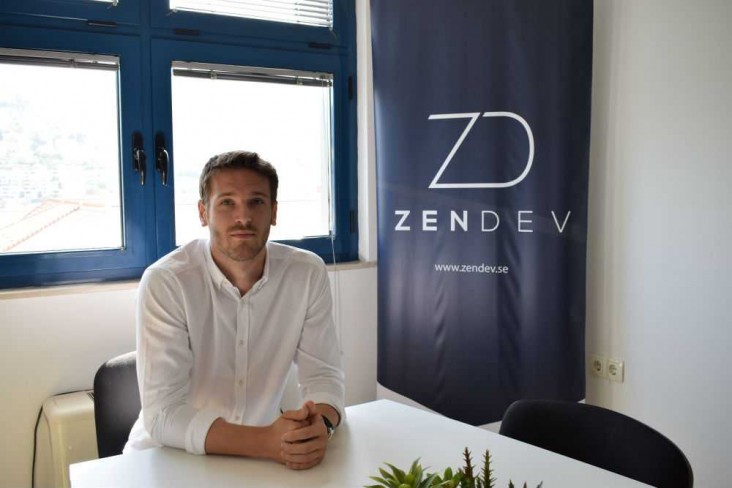Speeches Shim

July 2018 — Senad Santic was only 4 years old when he and his family fled to Sweden from Bosnia and Herzegovina (BiH) in 1993, in the midst of war. Like many other Bosnian diaspora, his family maintained close links to his native city of Mostar, spending most summers there after 1996.
Years later, Santic realized he wanted to connect his friends and business networks in Gothenburg, Sweden, with those in Mostar — and that’s exactly what he did.
After studying information technology (IT) in Sweden, Santic lived in the United States for a year, where he discovered his passion for business and entrepreneurship. He returned to Gothenburg and, together with some of his professors, started a company to develop a mobile application for local schools.
“But I always knew that I wanted to do something back home, and in the last couple of years, I felt that it was finally the right time to do so,” Santic said.
He contacted his friend Nikola Mirkovic, and they wrote a plan to establish an IT consulting company. Under the plan, Santic would return to Mostar and lead the operations and programming side of the business, and Mirkovic would stay in Sweden to find clients and business opportunities.
In 2016, Santic finally made the leap and co-founded an IT firm, ZenDev, that brought together his two hometowns separated by more than 1,000 miles.
Santic was quickly recognized by the local community as a credible and ambitious young entrepreneur willing to work with new ideas and provide new opportunities to Mostar youth. The firm shot up to 15 employees in less than 18 months, and Santic is confident that another five employees will be added to the company’s payroll by the end of 2018.
“We work mainly with the Swedish market, and the network of clients is expanding … every day,” said Santic, now 29.
One advantage to working in Bosnia, Santic said, is the availability of support to help his company expand and maximize the impact of investment.
“We received USAID co-financing support to buy equipment, software and, importantly, train and educate the staff. They [USAID] also connected us with other clients, and we now work together to expand the network and cooperation, both in the country and abroad,” said Santic. “USAID’s Diaspora Invest project facilitated this process and opened the space for us to create new jobs.”
He added, “Now is the time to invest in Bosnia and Herzegovina, as there’s enormous potential for growth.”
Bosnian software development exports surged by almost 30 percent in 2017 alone, with sector employment expanding by 17 percent.
“The workforce is there, along with great opportunities for development. Many are reluctant to invest in our country,” said Santic. “[But] our time is coming. We just need to make the first step.”
ZenDev is one of numerous small and medium-sized enterprises benefiting from the Diaspora Invest project, which facilitates new diaspora investment in BiH and provides grants and technical assistance to diaspora startups and early-stage firms. (See related story.) The program runs from April 2017 to March 2022.
LINKS
Follow @USAIDBIH (link is external), on Facebook (link is external)

Comment
Make a general inquiry or suggest an improvement.